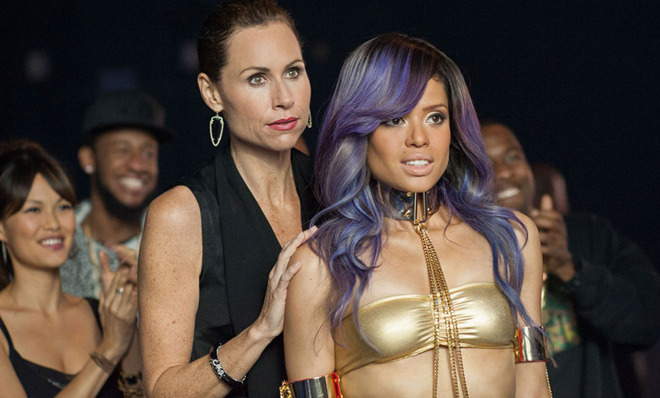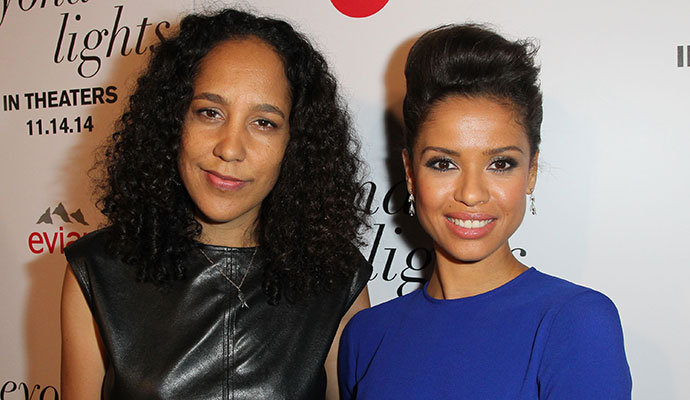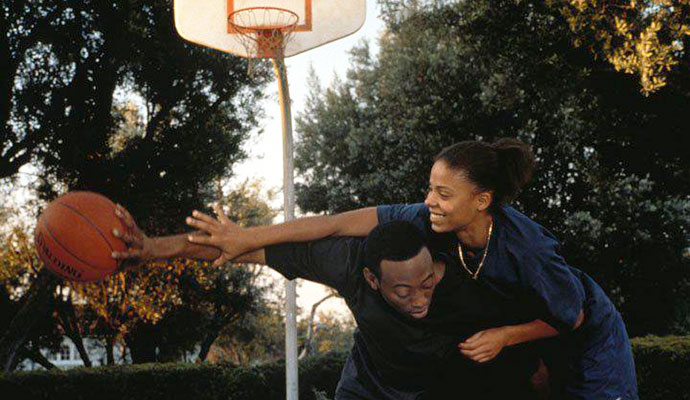Girls on Film: Gina Prince-Bythewood's ongoing struggle for racial diversity in romantic films
Director Gina Prince-Bythewood has spent her career making movies that push beyond Hollywood's typical definition of "diversity"


A free daily email with the biggest news stories of the day – and the best features from TheWeek.com
You are now subscribed
Your newsletter sign-up was successful
"Why you wanna fly Blackbird, you ain't ever gonna fly," sings Gugu Mbatha-Raw, as Noni, in the terrific new romantic drama Beyond the Lights. Noni is an aspiring singer whose label demands she belt out other people's lyrics and embrace a highly sexualized persona she hates. Over and over Noni returns to Nina Simone's "Blackbird" — her first musical inspiration, and the all-too-true anthem for her struggle to find agency and shed the pressures of others. It's a theme that could double as the lament of writer/director Gina Prince-Bythewood, who has worked under difficult filmmaking constraints from the beginning of her career.
Prince-Bythewood hit Hollywood during the Black Hollywood Renaissance of the '90s, and like many of the era, her initial success didn't lead to continued work. Prince-Bythewood started as a writer on the NBC sitcom A Different World. Within three years, she gained immediate success as a director when she earned two Emmy nominations for her first job on a CBS Schoolbreak Special. Five years later, her debut feature Love & Basketball in 2000 was winning Independent Spirit and Black Reel Awards.
Prince-Bythewood received some scripts after the success of her debut, but as she told The New York Times in 2009, "you still felt that as a black director, you had to prove yourself even harder, no matter what people were saying about this great renaissance of black film." Projects, including a Wally Lamb adaptation, fell through. She took time off for her children, and to produce her husband's 2003 film, Biker Boyz. When she finally got her sophomore feature, The Secret Life of Bees, off the ground in 2008, Prince-Bythewood once again earned solid critical acclaim and box office success.
The Week
Escape your echo chamber. Get the facts behind the news, plus analysis from multiple perspectives.

Sign up for The Week's Free Newsletters
From our morning news briefing to a weekly Good News Newsletter, get the best of The Week delivered directly to your inbox.
From our morning news briefing to a weekly Good News Newsletter, get the best of The Week delivered directly to your inbox.
Like all modern success stories, Prince-Bythewood's achievements were expected to breed more opportunities. "I know now that I can get my script read by everybody, and the doors will be opened wider," she'd told the Times after the success of Bees. But the one or two-year span it took to make her first two films became five years for Beyond the Lights. Studios feared having to market a film with two black stars, and wanted a white male lead.

Now Prince-Bythewood differentiates between the opportunity to work and the desire to work. "I can be working if I want to be working," she recently explained to Buzzfeed. "I don't feel me, as a black female director, is discriminated against. But what I want to focus on are people of color in my films, and specifically women. They're never an easy sell."
It's a rough irony of the business today, because Prince-Bythewood's romances are more relatable than most white-centric romances being released. She, like fellow independent romance filmmaker Jennifer Westfeldt, finds inspiration by adding depth to familiar genres instead of reinventing them. Her work is an ongoing reminder that fluffy entertainment and thoughtful filmmaking don't have to be two disparate approaches.
Prince Bythewood's debut feature, Love & Basketball, is still the most telling example of her work. Superficially, it is like any other escapist romance: Two people meet, bicker, and struggle to see if they can stay together. However, the odds in Prince-Bythewood's world are not about whether a frazzled mess can be tamed by a well-meaning guy, or whether the successful woman can loosen up for the slacker schlub. Instead, the question is whether two talented, middle-class athletes can stay together as their similar athleticism prompts very different challenges, as the film follows them through "four quarters" (or 12 years) of their lives.
A free daily email with the biggest news stories of the day – and the best features from TheWeek.com
From the love of the sport to the pressures of family and society, the challenges presented in Love & Basketball are universal concerns, not racial ones. When race does enter the picture in Prince-Bythewood's work — like the dynamics of a biracial child born to a white mother in Beyond the Lights — it's in service to life, not history or politics.
Unfortunately, Love & Basketball fell victim to racial cinematic segregation. It's overlooked in a culture that depends on what is marketed, and held within racial barriers. The film is listed as a must-see on sites like The Urban Daily, Essence, and BET, and praised by women like of Anupa Mistry and Roxanne Gay — but it's generally ignored elsewhere, unless a site is looking to make a list of "black romantic films." In romance listology, white and black don't mix.

As Karen Valby wrote earlier this year, the fans who remember Love & Basketball "cling to it" because "there's so few contemporary stories depicting romance between black characters." In Hollywood's insistence to focus on crucial, larger-than-life stories, Valby argues that "we're missing the chance to know and relate to everyday people and remember that we're all more than archetypes."
That's why it's so gratifying that Beyond the Lights continues the work that Prince-Bythewood started nearly 15 years ago. Like her previous films, Beyond the Lights is an answer the struggle Viola Davis shared with Valby after The Help. "I'm a black woman … I am so many things in so many ways and I will never see myself on screen. And the reason I will never see myself up on screen is because that does not translate with [people's ideas of] black."
Unfortunately, it would be premature to say that things are changing after the achievements of filmmakers like Dee Rees, Steve McQueen, Lee Daniels, and Ava Duvernay. Prince-Bythewood struggled for years to get Lights made, and three of the aforementioned filmmakers are making names for themselves by shooting historical features about butlers, civil rights, and slavery. Countless projects are refused because they feature diversity beyond lone icons and tokenism.
Now, in Beyond the Lights, Noni struggles to be seen as a person, not an untouchable icon, and her lover Kaz fights to be a man of real honor rather than a media-created political persona. They are blackbirds who want to fly, and it's gratifying that we finally have a film where they, and the real-life sentiments they embody, finally get to do so.
Girls on Film is a weekly column focusing on women and cinema. It can be found at TheWeek.com every Friday morning. And be sure to follow the Girls on Film Twitter feed for additional femme-con.
Monika Bartyzel is a freelance writer and creator of Girls on Film, a weekly look at femme-centric film news and concerns, now appearing at TheWeek.com. Her work has been published on sites including The Atlantic, Movies.com, Moviefone, Collider, and the now-defunct Cinematical, where she was a lead writer and assignment editor.
-
 What to know before filing your own taxes for the first time
What to know before filing your own taxes for the first timethe explainer Tackle this financial milestone with confidence
-
 The biggest box office flops of the 21st century
The biggest box office flops of the 21st centuryin depth Unnecessary remakes and turgid, expensive CGI-fests highlight this list of these most notorious box-office losers
-
 The 10 most infamous abductions in modern history
The 10 most infamous abductions in modern historyin depth The taking of Savannah Guthrie’s mother, Nancy, is the latest in a long string of high-profile kidnappings
